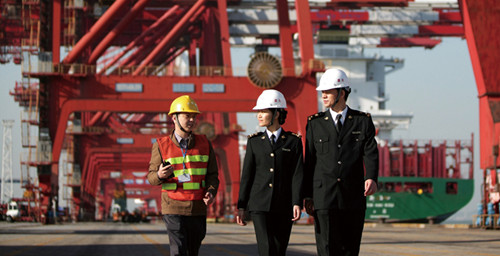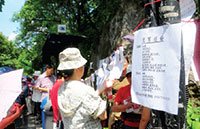Forum calls for new trade rules
By Zhang Zhao (China Daily) Updated: 2015-12-24 07:54At a forum in Guangzhou on Tuesday, industry insiders called for new rules in the Nansha Free Trade Zone to adapt to the current global and local economic environments.
Guangzhou's Nansha area is part of the China Guangdong Pilot Free Trade Zone.
Mao Yanhua, deputy director of the institute for free trade zone research at the local Sun Yat-Sen University, noted some features of current international trade after the global economic crisis.
"The importance of the commodities trade has greatly decreased, while service trade and open investment are becoming new highlights," he said.
"At the same time, developing countries are enjoying less preferential policies. Instead, their governments are required to take reforms to gain market access."
He said the Trans-Pacific Partnership Agreement, or TPP, is a new generation of international trade systems.
"The high standards in the TPP will in the long term help China open up and improve its market system, but in the short term, it is difficult for China to afford the cost of related reforms," he said, adding that free trade zones should be pilots in dealing with some difficult issues.
To cope with such challenges, he suggested that a theory system for fair market competition be established, and systematic reforms be taken in Nansha in sectors including farm produce trading, government purchasing, intellectual property, environmental protection and labor issues.
"For example, third-party environmental assessment can be introduced in the manufacturing sector in the zone, to test the results of the reforms and new regulations," he said.
He also suggested the local authority study the TPP rules to find "in what fields we still lag behind the TPP system".
"They may include negative-list management in market approval, the open service sector and cross-border trade facilitation," he said, adding that Nansha has advantages such as having attracted professionals from Hong Kong and Macao.
In addition, he called for a business standard system that reduces operational costs and focuses on the markets along the Silk Road Economic Belt and the 21st Century Maritime Silk Road.
 |
|
Local quality and quarantine inspectors at a port in the Nansha Free Trade Zone. Ports in Guangzhou are strengthening their ties with overseas countries and are creating plenty investment opportunities. [Photo/China Daily] |
Recent financial guidelines for the Guangdong Free Trade Zone, unveiled by China's central bank, also bring about opportunities for the development of Nansha, said Li Simin, deputy chief of the Guangzhou branch of the People's Bank of China.
The guidelines include 30 measures, covering fields such as the internationalization of the Chinese currency; reforms on foreign exchange management; financial cooperation among Guangdong, Hong Kong and Macao; and innovation-driven financial services.
"All the financial reform measures must be based on the real economy," Li said, adding that Nansha boasts a solid foundation in the real economy and a strong capacity for technical innovation, so it can be a pilot for the integration of finance, technology and industry.
To help Nansha with its financial reforms and innovations, Li said her bank would promote headquarters financing in the area, seeking to attract financial institutions to set up offices and regional headquarters.
It would also develop innovative financing services, such as those for the shipping industry. It aims to build Nansha into a regional modern logistics financing hub that serves not only Guangdong, but also Hong Kong and Macao.
It will also make efforts to create a credit environment that agrees with the area's financial reforms. A widely accepted credit rating agency will be introduced for cross-border financing services, she added.
zhangzhao@chinadaily.com.cn
- China concerned over downgrade of panda's conservation status
- First lady highlights China's fight against AIDS
- Beijing takes firm stance opposing HK agitators
- Nobel laureate Tu Youyou's team makes new progress on artemisinin research
- Giant panda no longer endangered - WWF
- Action, not words needed to lift economy
- CCDI shows progress in hunt for corrupt officials
- Old tale inspires modern marriage market
- Xi urges efforts of BRICS to improve global governance
- Premier Li offers condolences over death of Uzbek President Karimov







